|
|
|
Sort Order |
|
|
|
Items / Page
|
|
|
|
|
|
|
| Srl | Item |
| 1 |
ID:
131427
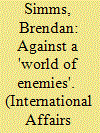

|
|
|
|
|
| Publication |
2014.
|
| Summary/Abstract |
Adolf Hitler's experiences during the First World War have been much discussed, with historians tending to concentrate on his involvement in the fighting and the operational lessons he later claimed to draw. Much less has been written about the impact of the war on his world view, though recent work has tended to suggest that his paranoid anti-Semitism was not yet visible during the conflict. Drawing on this latest research, but also on newly discovered sources and previously underused material, the author shows that Hitler's main preoccupation during the war and its immediate aftermath was the overwhelming power of Great Britain and its American ally. He associated these two powers with the alleged international Jewish economic conspiracy that had crushed the German empire. Hitler's anti-Semitism thus originated in an anti-capitalist, rather than anti-communist, discourse. He blamed Britain and the US for the rigours of the Versailles peace settlement, a moment which was far more politically formative for him than the experience of defeat itself. His encounter with American soldiers in the summer of 1918 also marked his first engagement with the global power of the United States and the start of a belief in the demographic weakness of the German empire which inspired his plans for Lebensraum in the east.
|
|
|
|
|
|
|
|
|
|
|
|
|
|
|
|
| 2 |
ID:
078948
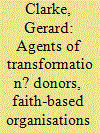

|
|
|
|
|
| Publication |
2007.
|
| Summary/Abstract |
Recent donor discourse points to the potential of faith-based organisations (fbos) as 'agents of transformation', mobilising the moral energy of faith communities in support of the Millennium Developments Goals (mdgs). This new donor-driven agenda, however, invites scrutiny of complementary processes of organisational change within donor institutions. This article therefore examines donor policy and practice concerned with engagement with fbos. While considering the work of a number of donors, it focuses on the UK Department for International Development (dfid) and traces the reasons for dfid's growing interest in fbos from 1997. It examines the challenges which dfid faces in further developing this engagement and considers whether it and others donors can themselves become 'agents of transformation', embracing a less material and less secular vision of well-being and a more culturally inclusive approach to partnership. In contrast to recent scholarship, which presents a benign view of the emerging 'faith and development' interface, this article considers it as a controversial new Zeitgeist in development policy and discourse.
|
|
|
|
|
|
|
|
|
|
|
|
|
|
|
|
| 3 |
ID:
066746
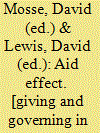

|
|
|
|
|
| Publication |
London, Pluto Press, 2005.
|
| Description |
vi, 223p.
|
| Series |
Anthropology, culture and society
|
| Standard Number |
0745323863
|
|
|
|
|
|
|
|
|
|
|
|
Copies: C:1/I:0,R:0,Q:0
Circulation
| Accession# | Call# | Current Location | Status | Policy | Location |
| 050388 | 306.3/MOS 050388 | Main | On Shelf | General | |
|
|
|
|
| 4 |
ID:
100372
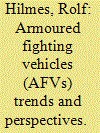

|
|
|
| 5 |
ID:
116884
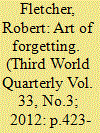

|
|
|
|
|
| Publication |
2012.
|
| Summary/Abstract |
This article explores the implications of a phenomenon that, following Renato Rosaldo's influential discussion of 'imperialist nostalgia', I call 'imperialist amnesia': the fetishistic disavowal of the legacy of European colonisation within contemporary postcolonial societies. I describe the manifestation of this amnesia in discourses as diverse as academic scholarship, international development and travel writing. Observing the recurrence of imperialist amnesia in the face of persistent attempts to historicise postcoloniality, I propose that the disavowal of colonialism functions as what Michael Taussig calls a 'public secret'-something commonly known but not generally acknowledged-helping to efface the grim realities of the colonial enterprise. Public secrecy by its nature defies most attempts at disclosure; hence efforts to publicise colonialism's contemporary influences may paradoxically reinforce their obfuscation by perpetuating the very imperialist amnesia they seek to dispel.
|
|
|
|
|
|
|
|
|
|
|
|
|
|
|
|
| 6 |
ID:
143916


|
|
|
|
|
| Summary/Abstract |
International scholarships for higher education are a large component of foreign aid in many high-income countries, including Australia. The aims for Australian scholarships awarded to African students are to achieve development in Africa and advance the influence of Australia. However, well-articulated theories of change that define how scholarships are linked to these and other outcomes are not available in the literature. In order to address this gap, the authors explore the perspectives of Australian-funded Master's-level alumni from Kenya, Uganda and Mozambique on the implementation process before, during and after their scholarship award, and the outcomes of the scholarships. The authors found that Australian scholarships to Africans have the potential to spread Australian influence, and that returnee scholars, by virtue of their study in Australia, gain the capacity to become agents for development in their country. The process of choosing scholarship awardees, the local circumstances in each country on return, and support and mentoring networks after return can influence the achievement of these outcomes. Investments in international scholarships should be directed to develop additional skills and facilitate networks in order to further prepare the returnee scholars to influence development in their country and perpetuate Australian influence.
|
|
|
|
|
|
|
|
|
|
|
|
|
|
|
|
| 7 |
ID:
156764


|
|
|
|
|
| Summary/Abstract |
This research note discusses the benefits and risks for Melanesian households arising from attempts to increasingly commercialise Canarium indicum, an edible tree nut indigenous to Papua New Guinea, the Solomon Islands and Vanuatu. Qualitative data were generated during workshops and interviews with Canarium industry stakeholders about the impacts associated with a series of interventions designed to encourage further commercialisation of Canarium. The findings are organised according to three dimensions that elucidate the social implications of industry development for local communities: (i) income and growth; (ii) equity; and (iii) voice and choice. Broader distribution of benefits within and between countries, as well as among supply chain actors, requires a stronger policy response at regional (Melanesia) and national scales, equitable gender representation to avoid reinforcing existing inequalities, and delegation of decision-making power to the appropriate level to facilitate effective community participation and their links with other stakeholders. Thus, it remains to be seen whether Canarium-related benefits arising from its commercialisation can be sufficiently reliable compared with either other sources of income (e.g. existing employment opportunities for those located near urban areas) or utilising the resource for subsistence purposes.
|
|
|
|
|
|
|
|
|
|
|
|
|
|
|
|
| 8 |
ID:
155424


|
|
|
|
|
| Summary/Abstract |
In this article we explore the implications of Brexit for the UK and the EU's development policies and strategic directions, focusing on the former. While it is likely that the operational process of disentangling the UK from the various development institutions of the EU will be relatively straightforward, the choices that lie ahead about whether and how to cooperate thereafter are more complex. Aid and development policy touches on a wide range of interests—security, trade, climate change, migration, gender rights, and so on. We argue that Brexit will accelerate existing trends within UK development policy, notably towards the growing priority of private sector-led economic growth strategies and blended finance tools. There are strong signals that UK aid will be cut, as successive secretaries of state appear unable to persuade a substantial section of the public and media that UK aid and development policy serves UK interests in a variety of ways.
|
|
|
|
|
|
|
|
|
|
|
|
|
|
|
|
| 9 |
ID:
078938
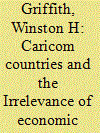

|
|
|
|
|
| Publication |
2007.
|
| Summary/Abstract |
The pioneers of development argued that natural resources determined a country's economic structure of production. Since a small country would of necessity have a smaller endowment of natural resources than a large country, they further argued that the economic structure of production of a small country would be more concentrated than that of a large country. This article contends that economic smallness is no longer an important determinant of a country's economic structure of production. The global economy is becoming more and more integrated and knowledge skills have become the most important resource in production processes. If, therefore, small countries such as those in Caricom can accumulate in sufficient quantities the appropriate knowledge skills, they can have a diversified economic structure of production by developing new products and services, and by attracting foreign direct investment
|
|
|
|
|
|
|
|
|
|
|
|
|
|
|
|
| 10 |
ID:
086011


|
|
|
|
|
| Publication |
2009.
|
| Summary/Abstract |
'Women's empowerment', as used by international development organisations, is a fuzzy concept. Historical textual analysis and interviews with officials in development agencies reveal its adaptability and capacity to carry multiple meanings that variously wax and wane in their discursive influence. Today a privileging of instrumentalist meanings of empowerment associated with efficiency and growth are crowding out more socially transformative meanings associated with rights and collective action. In their efforts to make headway in what has become an unfavourable policy environment, officials in development agencies with a commitment to a broader social change agenda juggle these different meanings, strategically exploiting the concept's polysemic nature to keep that agenda alive. We argue for a politics of solidarity between such officials and feminist activists. We encourage the latter to challenge the prevailing instrumentalist discourse of empowerment with a clear, well articulated call for social transformation, while alerting them to how those with the same agenda within international development agencies may well be choosing their words with care, even if what they say appears fuzzy.
|
|
|
|
|
|
|
|
|
|
|
|
|
|
|
|
| 11 |
ID:
180070
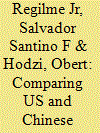

|
|
|
|
|
| Summary/Abstract |
China is emerging as a key state actor in international development – a sector that has been dominated by the United States for decades. US and Chinese foreign aid programs can be compared on the basis of several benchmarks: 1) official state definition and accounting of foreign aid programs; 2) historical foundations and origins; 3) sectoral distribution, particularly in terms of the professed goals and objectives of the aid program; 4) nature of targeted recipient actors; 5) institutional mechanisms for delivery in recipient countries. Notwithstanding particular differences, Chinese and US foreign aid portfolios demonstrate their respective strategic political and economic interests in two ways: they shape the domestic politics of recipient countries in ways that accommodate the donor government’s policy preferences, and they enhance the social reputation and legitimacy of the donor state in the international system.
|
|
|
|
|
|
|
|
|
|
|
|
|
|
|
|
| 12 |
ID:
062045
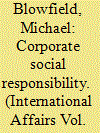

|
|
|
|
|
| Publication |
May 2005.
|
| Summary/Abstract |
Corporate Social Responsibility (CSR) has been adopted as an approach to international development. But who does it benefit and in what ways? Most importantly, does it allow certain interest groups to redefine the meaning of international development success?
This article examines the historical relationship between business and development and compares how expectations of business as exemplified through CSR practices differ from those in the past. It then looks at the role and expectations of business in developing countries and proposes two tests for assessing if CSR makes a positive contribution to development goals based on whether it redefines the meaning of good business practice in the interests of the poor and marginalized, and if it helps development practitioners to manage more effectively the possibility and consequences of global capitalism for poor countries.
The article argues that the interests of business are not adequately aligned with those of the poor, and explains why CSR does little to redress this. It argues that the business case in some instances overrides the developmental case for certain actions, and that business thinking is increasingly evident in the policies and practices of international development. Although CSR may have a positive contribution to make in some circumstances, its limitations need to be understood if development's case for involving business is not to be subsumed by business reasons for engaging with (and by-passing) developing countries.
|
|
|
|
|
|
|
|
|
|
|
|
|
|
|
|
| 13 |
ID:
103308
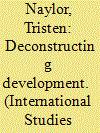

|
|
|
|
|
| Publication |
2011.
|
| Summary/Abstract |
This study examines how power operates within international development discourse and investigates its effects on development organizations and on individuals-donors and recipients of aid alike. It analyzes the narratives pertaining to Afghanistan that are (re)produced by five different types of development actors: a donor state, a recipient state, an international financial institution, an international organization, and a non-governmental organization. I argue that the operation of multiple, interrelated types of power has both ideational and material effects which manifest in development policies, programs, and projects. I demonstrate how these types of power operate discursively through a Politics of Pity which (re)creates and perpetuates hierarchical, coconstituted relationships between and among these actors, and which (re)constitutes the identities and abilities of actors.
|
|
|
|
|
|
|
|
|
|
|
|
|
|
|
|
| 14 |
ID:
165780
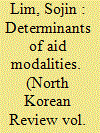

|
|
|
| 15 |
ID:
060407
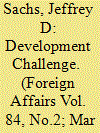

|
|
|
|
|
| Publication |
Mar-Apr 2005.
|
| Summary/Abstract |
As a matter of policy, Washington is committed to supporting development in impoverished countries, and most Americans believe that it is following through. In fact, U.S. assistance for the world's poorest countries is utterly inadequate. Only a new international development strategy can rectify the situation. Continued failure will be too expensive, for the United States and the world.
|
|
|
|
|
|
|
|
|
|
|
|
|
|
|
|
| 16 |
ID:
124175
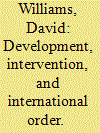

|
|
|
|
|
| Publication |
2013.
|
| Summary/Abstract |
The project of international development involves the reordering of states (or at least attempts to do so), it sits at the intersection between transnational forces and bounded political entities and it is a manifestation of the will to order of powerful states. It would seem then to be closely connected to practices of intervention. At times, the practices of development agencies have taken on a more interventionist character, but in recent years their relationship to many developing countries has taken on a more intricate, subtle, and everyday form. It has in important respects moved 'beyond' intervention. This has significance beyond international development. Development agencies have been recruited to wider projects of international ordering, especially the construction of regimes of global governance and the 'development' of post-intervention states.
|
|
|
|
|
|
|
|
|
|
|
|
|
|
|
|
| 17 |
ID:
108088
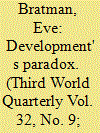

|
|
|
|
|
| Publication |
2011.
|
| Summary/Abstract |
This article examines an urban centre in the heart of the First World through a critical development lens. It contends that traits of the Third World entail certain characteristics which remain consequential as axes of analysis for a variety of economic, political and geographic settings, including new applications in contexts that are typically excluded from the focus of international development practice and scholarship. The article discusses characteristics of 'third worldality' in relation to Washington DC. It posits that, despite being emblematic as a power centre, the city exhibits many of the characteristics of a Third World city. Highlighting disenfranchisement, socioeconomic inequality, and environmental health issues, the article reveals a paradox: underdevelopment in the heart of the 'developed' world. The article calls for greater recognition of the paradoxes of development theory and practice so as to confront persistent problems of orientalism and lack of self-reflexivity in the field of international development.
|
|
|
|
|
|
|
|
|
|
|
|
|
|
|
|
| 18 |
ID:
085930
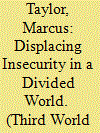

|
|
|
|
|
| Publication |
2009.
|
| Summary/Abstract |
The current triple crisis of food, oil and credit has accentuated social instability across global capitalism, with the most severe effects displaced onto the urban and rural poor who, in the face of escalating prices for staple goods, face deepening immiseration. Mounting social unrest has led the international institutions of global governance to assess the crisis in terms of its security implications. This strategy has two related dimensions. On the one hand, it is part of a discourse that seeks to exceptionalise the current crisis and obscure its social foundations rooted in the evolution of global capitalism in its neoliberal form. On the other, it prepares the ground for interventions that attempt to uphold the status quo of a profoundly uneven global division of labour and consumption. The current crisis, however, reveals not an exceptional situation in need of securitisation, but the degree to which the current global capitalist order inherently displaces insecurity onto marginalised populations in order to reproduce the social conditions for accumulation at a global level. This process of displacement is examined on two levels. First, displacing insecurity is woven into an expanding international division of labour, in which 'cheap labour' is socially constructed and reproduced to toil within a global factory. Second, it is inherent to the consolidation of a global division of consumption in which Western mass consumption displaces ecological costs onto the global majority, creating grave insecurities over future life and livelihoods.
|
|
|
|
|
|
|
|
|
|
|
|
|
|
|
|
| 19 |
ID:
136056
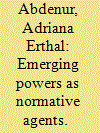

|
|
|
|
|
| Summary/Abstract |
Institutions are frequently thought of as ‘socialising’ member states into pre-established norms. However, this influence is not necessarily a one-way street; members can also affect institutions, whether individually or collectively. This article analyses the behaviour of two emerging powers – Brazil and China – within the field of international development. What roles have these two states played in shaping global development norms? The article examines the key motivations, positions, and initiatives taken by Brazil and China, with special reference to the UN development system (unds). Whereas Brazil and China’s early behaviour within the unds diverged significantly, in the post-cold war period both have become increasingly interested in – and capable of – influencing UN norms. However, despite greater involvement in UN development negotiations, these countries’ leverage in normative debates originates outside of the unds, through their South–South cooperation programmes. The current diversification of platforms through which the norms of international development are negotiated may enhance the influence of emerging powers, although their ability to channel this influence effectively will depend on their capacity for norm entrepreneurship, rather than mere norm blocking.
|
|
|
|
|
|
|
|
|
|
|
|
|
|
|
|
| 20 |
ID:
079947
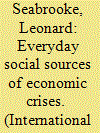

|
|
|
|
|
| Publication |
2007.
|
| Summary/Abstract |
Who drives domestic institutional change in the face of international economic crisis? For materialists, self-interested actors struggle for material gains during exogenously generated crises. For constructivists, norm entrepreneurs strategically construct how crises should be interpreted to justify certain institutional reforms. While both these approaches are analytically powerful, they suffer from an implicit view of legitimacy as established by elite command or proclamation during periods of uncertainty. This article adds an extra piece to the puzzle of which institutional reforms are selected in the construction of a crisis. It suggests that everyday discourses constructed by mass public agents, or non-elites, provide impulses for elite actors to select institutional reforms that will receive social legitimacy. The article re-examines the case of interwar Britain, arguing that a "legitimacy gap" between elite and mass understandings informed institutional experimentation during the 1920s and 1930s, fertilizing the eventual "Keynesian Revolution." In this way, this article seeks to show how the expressive practices and changing conventions of non-elite agents can shape institutional development. It also suggests that an "agent-centered constructivism" interested in explaining institutional change may be well served by taking into account popular as well as elite views
|
|
|
|
|
|
|
|
|
|
|
|
|
|
|
|
|
|
|
|
|